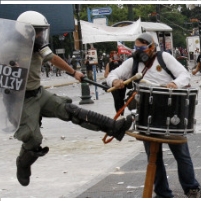Surprise! Budget Cuts Lead to Rioting…a 90-Year History
Friday, August 12, 2011
 Police and protestor in Greece (AP Photo)
Police and protestor in Greece (AP Photo)
Civil unrest can be brought about by a government’s change in economic policy, specifically efforts to reduce spending or impose harsh austerity measures. Researchers at the Centre for Economic Policy Research reviewed historical data from the 1930s to today, taking into consideration everything from the post-World War I state of Germany’s Weimar Republic to the recent economic turmoil experienced by Greece. They concluded that “austerity has tended to go hand in hand with politically motivated violence and social instability,” adding that, “The results show a clear positive correlation between fiscal retrenchment and instability.” They also noted that public unrest is simply not a direct result of recessions or depressions, but is instead produced by conscious choices to cut government expenditures.
Demonstrations, riots, assassinations and general strikes all rose in proportion to harshness of cutbacks in social spending. The only exception was rioting, which saw a small decline after the biggest cutbacks.
The authors of the report, Jacopo Ponticelli and Hans-Joachim Voth, did note that, “Contrary to what might be expected, we also find no evidence that the spread of mass media facilitates the rise of mass protests.”
-Noel Brinkerhoff, David Wallechinsky
Austerity and Anarchy: Budget Cuts and Social Unrest in Europe, 1919-2009 (by Jacopo Ponticelli and Hans-Joachim Voth, Centre for Economic Policy Research) (pdf)
- Top Stories
- Unusual News
- Where is the Money Going?
- Controversies
- U.S. and the World
- Appointments and Resignations
- Latest News
- Trump Renames National Football League National Trump League
- Trump to Stop Deportations If…
- Trump Denounces World Series
- What If China Invaded the United States?
- Donald Trump Has a Mental Health Problem and It Has a Name






Comments